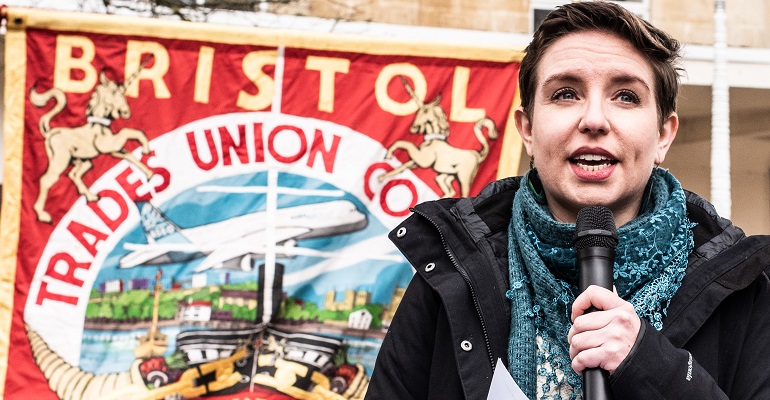"The time has come to mobilise millions of workers to dismantle and rebuild our broken economy, and heal our damaged planet."

Carla Denyer is co-leader of the Green Party of England and Wales and the Member of Parliament for Bristol Central.
The Trades Union Congress (TUC) has called for a just transition to a net-zero world. As a Green MP, I’m pushing the government to ensure no worker is left behind, by developing a fully funded Green New Deal that ensures good, green jobs and training for all workers in high carbon sectors such as oil and gas.
Decades after the closures of coal pits which devastated countless working class communities, former coal mining areas are still scarred by the results of an unjust transition. Health and prosperity, shops and services, jobs and training have been irreparably ruined. No government must ever repeat the Thatcher government’s legacy of inflicting devastation upon working class communities.
Oil and gas companies have profited from the exploitation of workers and the planet for far too long. The fossil fuel industry has created huge fortunes for shareholders while pay has stagnated for those workers doing the hard, often dangerous graft on the oil rigs. The time has come to mobilise millions of workers to dismantle and rebuild our broken economy, and heal our damaged planet.
A just transition underpinned by a Green New Deal must put workers and communities at the heart of building the new energy system that will keep us within the scientific limits of our climate. That is how we will bring communities along with us and achieve prosperity and stability, now and in the future.
The Green Industrial Revolution (part of a Green New Deal although the latter goes beyond far beyond just industry) will need every worker we can muster. It has been suggested that one of the reasons Labour dropped their £28bn climate investment pledge is that the workforce of the future is not yet available. The government must ensure our pathway to net-zero is not hindered by worker shortages or skills gaps.
Many jobs and skills in oil and gas are transferable to green industries, but there can be financial and bureaucratic hurdles for the many workers who want to go green. Many oil and gas workers are employed on short term, ad-hoc contracts and required to pay for their own training courses and qualifications. Much of the training to move into green industries is also self-funded, resulting in a double-whammy of expenses and lost income. We can’t just put the burden on workers to go out, train up, and hope for the best. It’s these basic economic realities of the here and now that worry people about the future, no matter how bright the opportunities might be.
The government can clear away those worries by guaranteeing opportunities for all workers. Investing in good, clean jobs, simplifying the transfer of qualifications between industries, and opening up clear pathways for workers to move across. Upskilling and retraining can be supported with paid time off work, subsidised adult education, and salary continuation for laid off workers. This is how we bring people along at the speed the science needs while protecting their livelihoods.
There is much that government can do, but a lot will also depend on the relations between workers, their unions, and employers. High carbon industries should be planning a just transition in collaboration with their workforce, preparing for the rapid phaseout of fossil fuels. This should prepare workers for the jobs of the future and, where those jobs are available within the existing employer’s business, allow swift and smooth transfers while protecting pay and conditions. Certainty can be given by formalising these plans as collective agreements, which become an enforceable contract that workers can rely on.
Far from the misleading media reports that the TUC Congress has rejected net-zero as being anti-jobs, the interests of workers, unions, and the climate are heavily overlapping – each is dependent on the support of the other. The role of this new government is to support workers in the high-carbon economy to move, swiftly and securely, into the green jobs of the future. Neither of the alternatives, runaway climate change or decimated communities, bear thinking about.
Image credit: Matthew Philip Long – Creative Commons
Left Foot Forward doesn't have the backing of big business or billionaires. We rely on the kind and generous support of ordinary people like you.
You can support hard-hitting journalism that holds the right to account, provides a forum for debate among progressives, and covers the stories the rest of the media ignore. Donate today.



